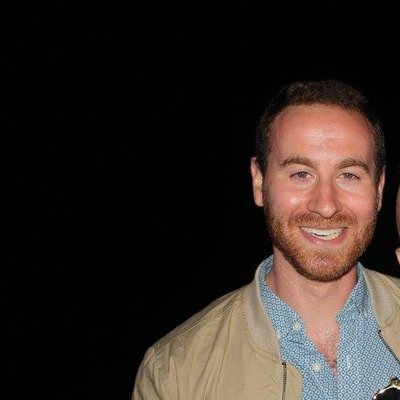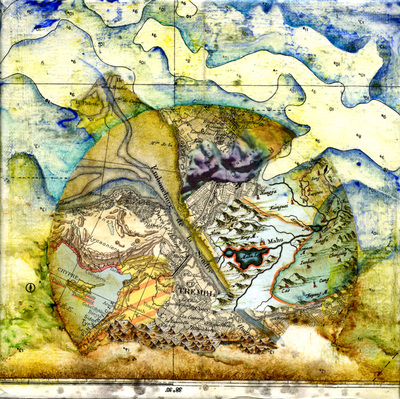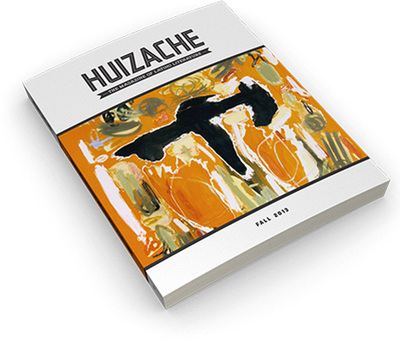Farawaystan by Petter Lindgren,
translated from the Swedish by Lars Ahlström
Marick Press, 2009
Reviewed by Scott Wordsman
One of my earliest memories from graduate school involves my thesis advisor combing the troves of his bookshelf and returning with a dense white book, thick as a brick. We had just reviewed a few of my attempts at avant garde poems when he said he had just what I needed and handed me Verse Press’ 20th anniversary anthology, The Second Decade. Flipping through its 600 pages—dog-ears, marginalia, and all—I could feel the weight of its influences burning holes in my hands. Fast forward three years, and I’ve yet to return the book (one part neglect, three parts foreseeable heartache), but that’s a secret best left unwritten. Alas.
Only one of Petter Lindgren’s poems made the editors’ cut, and that poem turned out to be “Klondike,” a deft little piece, forthright in wit yet cryptic in aim. Arresting in its distance, the poem was like nothing I had previously read (save maybe for Paul Maliszewski’s short stories); that said, I would soon come to recognize Lindgren’s enigmatic candor as a hallmark of his style. Take “Klondike” in its entirety:
At the end of the small tube that the doctor inserts into
the rectum of the patient there is among many other things
a tiny lens and an even tinier light. But there is also a photographer,
a grip, an electrician, a few extras and a recently graduated
script girl from Stockholm. Around this activity a small society
has been created: barracks, daycare, a supermarket, a restaurant.
This creates new work opportunities. Some people say that the entire
region has gained new life.
While this poem could be interpreted in a handful of ways, what distinguishes Lindgren’s work is his knack for subtlety, how he shies away from obvious or otherwise heavy-handed opinions while still expounding the peculiarities of modern life. Although some readers may prefer a narrator whose stances are more overt, with whose side they can easily align, Lindgren largely removes himself from the conversation, inserting only dry bits of criticism, and seldom. In one poem, the speaker drifts through a retirement home, talking to elderly relatives and “agreeing that insanity / and artistic skill is something you inherit / or that the people who run the radio station ought to be fired.” In another, he spots the blinking lights of a Finnish airplane in the sky while bicycling home on an icy night. As his tires skid over frozen ground, he thinks warmly of the polite, high-heeled flight attendants in the fuselage above: “If one is to die / one may very well do it in the company of women like these / It is actually a quite comforting thought.”
Lindgren’s oddly comic moments give the book its flourish, yet it is when he swaps his trademark snark for sentimentality that he achieves the most success. In “Monopoly,” a 46-line slice of heartache, the poet switches POV and embodies the persona of a woman whose memories of a past relationship with an unnamed architect have all but dissipated, leaving her to feel as if they had occurred in another life, but not always:
And it may be right when you say
that the greater part of you has forgotten him
but not all of you
As sometimes in the morning as you
make your hair into a long and painful plait
the smell of blueprints and
almond flowers comes to you as a draught
from your pale and in some way
conserved skin on the forearm
The clinical coolness of Lindgren’s delivery lends a touch of remove to the woman’s longing. Her lethargy is palpable, and it casts the poem in dreary, glacial light. Crawling along with our crestfallen narrator, it becomes evident that the piece’s locus, which at first concerns love and loss, begins to pivot more around the isolating effects of memory, as well as the sweeping ambivalence that accompanies nostalgia. As such, when we are provided details about the architect, they are revealed largely through a matter-of-fact, minimalist lens—as if our speaker were looking through a book of old photographs and adding a caption to the best of her wan ability:
It was when the almond trees were in bloom
the stubble on the architect’s chin was as sharp
as the end of a pair of compasses…
And by the table the architect crouched
over his crossword puzzle looking for a synonym
to the word concubine with nine letters
beginning with an m and ending with an s
These little snippets of a life spent together construct much of the poem’s suspense (was the speaker the architect's mistress?); moreover, these moments imbue the poem with a refreshing sense of the quotidian. The fact that relationships, even those we romanticize, are had by average people with customary quirks and habits sometimes eludes us, especially when considering the human tendency to glamorize old flames and current crushes, or to evaluate personal experiences as peerless, singular.
Doubling down on that notion, how the plain and ordinary is a thing which need not be aggrandized, but valued for its authenticity, comes “A Hologram,” the last poem in Farawaystan’s first section. This piece, in the stylistic vein of “Monopoly,” is a placid account of the jouissance the speaker derives from the small treasures he keeps in his bedroom:
In the evenings I turn on the light in my globe.
The Pacific Ocean is a big void, so it is facing the wall. No one lives in the Pacific
Ocean anyway.
Some of the countries on my globe don’t exist any longer.
If I go out before dusk, I turn on the light in my globe so that it brightens up the
room when I return, especially when I know that I will have company.
Sometimes I go out into the yard and see it glow from there. I’m thinking it would
be strange if I saw myself moving around in the apartment.
On its surface, the poem seems a bit silly, but as it continues, the details of the globe sharpen; we also meet the speaker’s radio (with gramophone intact), as well as his vintage, accordion-style camera. While a list of one’s keepsakes might not seem like enough to propel a poem, the exhaustive descriptions reveal much about the speaker’s neurotic proclivities, the way in which he threads the nexus between his own strange life and the world outside:
One time a woman came back home with me. She immediately turned on the
light in the ceiling, that otherwise is only on when I fiddle with small tools.
One should be careful to avoid letting out the ugly.
My globe stands on the radio. In the midriff of the radio
there is a grey-green magical eye that shows if the
station is correctly tuned. Many cities in the band of frequencies have changed names.
I want people to appreciate both the beautiful music from the radio and the
beautiful light from the globe.
“The music is beautiful,” I say to people.
And to her that let the ugly out:
“You are beautiful too. Turn off the light in the ceiling!”
The woman, we find out, becomes the subject of a blurry photograph the speaker takes, and then, eventually, little more than a fuzzed-out memory. As for the speaker, he slips further down his rabbit hole, flitting between semi-relevant subjects yet surfacing for air to discuss his camera, radio, and globe. Then, in a dreamlike twist, the poem’s final moments divert from earlier content, and the image Lindgren ends on, although stark and alluring, seems culled out of Ashberian air:
One time I took a picture of the beautiful woman, but she didn’t stand still.
She kept talking and swinging her long black hair.
The only sharp things in the photograph are the globe and the radio.
I don’t remember what she looked like.
In spring soundless projectiles fly high above the city. They glitter in the sun like
silver coloured dragonflies. No one knows what far away artillery fired them or
where they are going. And it’s not really my business.
While this surreal non sequitur, taken at face value, seems unconnected to earlier parts of the poem, it can be viewed, perhaps, as a harbinger, for Lindgren, in later poems, slides jumpy references to comets and projectiles, further solidifying his book’s title--it really feels as if we’ve entered a ‘faraway town’ where the rules of traditional narration need not apply.
The pleasure derived from reading Farawaystan extends beyond its simplicity and levity; what Petter Lindgren has done is constructed a world steeped in the inner lives of its speakers, who shift at times, but who are bound by their keen sense of self-awareness. By packing his poems with subtlety and accessible language, Lindgren has opened the door for deeper questions to be asked: On what topics should we focus our poems? And do topics really matter, or is it the scattershot content of our inner lives which resonates most? While the modern reader might hanker for a book with a clearer aim, or a goal more steeped in protest or subversion, this book succeeds in that it does not occupy itself with what Poetry may consider necessary. No poem feels too ambitious; no poem seeks to preach or proselytize. However, there is still much to be gleaned, in terms of meaning, from each strange slice of life the poet gifts us.
Copyright © April 2018 Scott Wordsman and Map Literary









